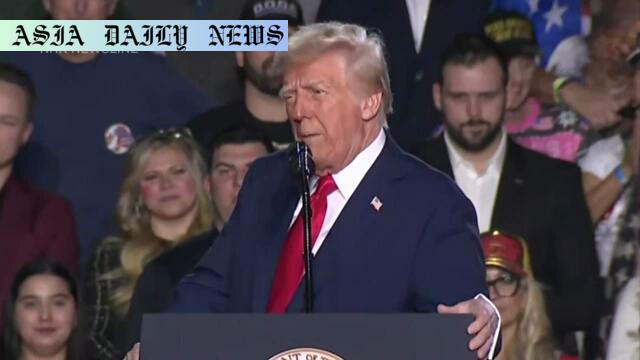Trump reconsiders US role in WHO, questions contributions based on fairness.

Trump’s Potential Reengagement with the WHO
In a surprising announcement, US President Donald Trump stated he would reconsider the United States’ withdrawal from the World Health Organization (WHO) under specific conditions. Speaking at a rally in Las Vegas, Trump expressed his willingness to rejoin the global health body if the organization lowered US contributions to align with China’s financial involvement. Trump’s demand stems from his belief that Washington unfairly allocates a disproportionate amount of funding when compared to China, despite the United States having a smaller population. The announcement reflects a potential recalibration of his administration’s previous stances on international cooperation and funding policies.
Challenging Global Equity in Financial Contributions
The WHO funding debate reveals a broader push by Trump to address financial imbalances in global organizations. While the United States has historically contributed the largest share to entities such as the WHO, Trump has consistently called for burden-sharing among member nations. Aligning contributions with economic metrics or population size is one possible way to achieve this. However, critics argue that cutting contributions could weaken the WHO’s ability to respond to future global health crises. Trump’s remarks reignite discussions on the role equity plays in financial responsibilities for international bodies.
Boosting Economic Investments from Saudi Arabia
In addition to discussing the WHO, Trump underlined his economic vision by revealing plans to request Saudi Arabia to increase its investments in the US from $600 billion to a staggering $1 trillion. During his speech, Trump emphasized the importance of foreign direct investment in boosting national economic growth. While details of how this increase will be negotiated remain unclear, Saudi Arabia’s strategic role as a key ally in the Middle East could facilitate cooperation in financing energy projects, infrastructure, and technology initiatives.
Energy Policies and Pressure on OPEC
Another focal point of Trump’s address revolved around energy. He stated his intention to approach Saudi Arabia and other OPEC member nations to reduce crude oil prices, underscoring his administration’s commitment to energy affordability. Lowering oil prices would not only benefit American consumers but also bolster domestic industries that rely heavily on energy resources. Trump’s focus on energy policies ties back to concerns over inflation and economic competitiveness, areas that remain critical for sustaining the nation’s growth trajectory.
Invitation to Address Congress
Adding a political dimension to the discussion, US House Speaker Mike Johnson invited Trump to address a joint session of Congress on March 4. The invitation signifies an important moment in defining Trump’s leadership strategies as the political landscape evolves. This joint session could serve as a platform for Trump to further elucidate his policy priorities, including international relations, economic reform, and energy independence. The event will attract global attention as Trump navigates between continuity and change in shaping the nation’s agenda.
Repercussions and Global Impact
Trump’s comments carry significant implications across multiple domains, including healthcare, economic investments, and energy policy. Rejoining the WHO with reduced dues could potentially lead to a shift in global health dynamics, as other countries could demand similar concessions. On the economic front, increased Saudi investments would enhance fiscal stability while strengthening bilateral ties. Lastly, engaging OPEC members on oil prices could set precedents for future collaboration on energy policies.
Conclusion
President Trump’s latest statements demonstrate his administration’s intent to challenge the status quo while pursuing pragmatic solutions across various domains. From renegotiating contributions to the WHO to emphasizing economic partnerships with Saudi Arabia, Trump’s approach underscores his strategy of leveraging economic and political influence. As global stakeholders analyze these emerging policies, the next steps taken by the US government will likely shape international and domestic priorities in meaningful ways.
Commentary
Reevaluating US-Global Engagement
President Trump’s renewed interest in the World Health Organization (WHO) highlights a fascinating shift in his approach to multilateralism. While his initial decision to withdraw the US from the WHO was widely criticized, this reconsideration demonstrates an acknowledgement of the importance of global cooperation. However, tying US participation to reduced contributions may open a contentious dialogue on fairness versus responsibility in funding international organizations. Balancing these considerations will be critical as Trump navigates this diplomatic terrain.
The Pursuit of Economic Dominance
Trump’s ambitious economic agenda, particularly his plan to increase Saudi investments in the US to $1 trillion, reflects his focus on driving economic prosperity. Foreign direct investment can play a pivotal role in infrastructure development, job creation, and innovation, aligning with Trump’s broader economic vision. Yet, there remains a need for transparency and clear objectives to ensure these investments align with national priorities and benefit the American public.
Energy Affordability and Geopolitics
Energy policies continue to be a cornerstone of Trump’s leadership. His call for OPEC nations to lower crude oil prices aligns with his commitment to strengthening domestic industries and alleviating the burden on American families. However, securing cooperation from OPEC may prove challenging, especially given the complexities of international energy markets. Striking a balance between diplomacy and assertiveness will be essential for achieving meaningful outcomes in this domain.
A Pivotal Moment in US Politics
The invitation to address Congress offers President Trump a unique opportunity to articulate his vision for the nation. As he continues to redefine key policies, this platform could serve to unite domestic audiences while sending a clear message to global stakeholders. Whether addressing healthcare, economic growth, or energy, Trump’s actions in the coming months will have far-reaching impacts. Observers will closely watch how these priorities unfold on both national and international stages.


